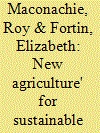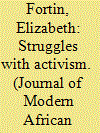| Srl | Item |
| 1 |
ID:
120921


|
|
|
|
|
| Publication |
2013.
|
| Summary/Abstract |
In sub-Saharan Africa, commercial bioenergy production has been hailed as a new form of 'green capitalism' that will deliver 'win-win' outcomes and 'pro poor' development. Yet in an era of global economic recession and soaring food prices, biofuel 'sustainability' has been at the centre of controversy. This paper focuses on the case of post-war Sierra Leone, a country that has over the last decade been consistently ranked as one of the poorest in the world, facing food insecurity, high unemployment and entrenched poverty. Following a recent government strategy to secure foreign direct investment in biofuels production in agriculturally rich regions of the country, the largest foreign investment in Sierra Leone since the end of its civil war has been secured: a Swiss company is to invest US$368 million into a large-scale biofuels project over the course of 3 years, and promises to simultaneously stimulate an enabling environment for investment, provide job opportunities for youth and increase food production. For multiple actors involved in the project, the concept of 'sustainability' is crucial but accordingly there are varying interpretations of its meaning. Such differences in interpretation and the complex contradictions within discourses of sustainability are in turn framed by the various scales within which these actors are situated. While attempts have been made to manage these contradictions through global sustainability standards, the unequal power relations between different actors will ultimately determine the ways in which they are likely to be resolved. The paper concludes by reflecting on how these processes may be contributing to a changing governance landscape and wider global political economy within which bioenergy is being produced, processed and consumed.
|
|
|
|
|
|
|
|
|
|
|
|
|
|
|
|
| 2 |
ID:
099367


|
|
|
|
|
| Publication |
2010.
|
| Summary/Abstract |
In 2004, a long-awaited piece of post-apartheid legislation, the Communal Land Rights Act - to reform the land tenure of those living in the former 'homelands' of South Africa - was passed into law unanimously by parliament. This unanimity, however, conceals the extent to which the process towards this moment was deeply contested. Exploring the efforts by land sector NGOs to secure legitimacy in their engagements with this process reveals the extent to which wider power relations and contestations have determined their positioning. Those within the non-governmental land sector who opposed the legislation pitted themselves against African National Congress politicians and high-profile traditional leaders. However, the adoption of a Mamdani-inspired discourse to contest such politics and oppose the proposed legislation contributed to reinscribing narrow readings of knowledge considered to be legitimate. Their engagements were also shaped by changes in the NGO sector. Reduced funding for land sector NGOs and an increasingly ambivalent relationship between them and government contributed to contestations between NGOs and among people working within them. Their strategic engagements in such wider and internal politics influenced both the frames within which such policy change could be debated and the ways in which individuals working for NGOs consequently positioned themselves in relation to their constituents.
|
|
|
|
|
|
|
|
|
|
|
|
|
|
|
|